V for Vendetta vs. The Dark Knight: Depictions of Anarchy
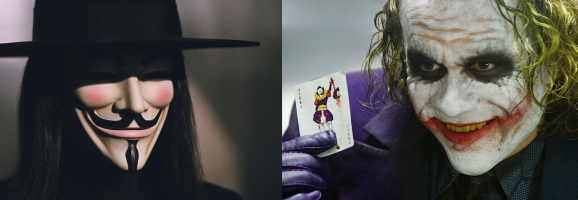
Comic book movies have evolved from the simple formula of heroes in capes fighting criminals, to telling dark and politically complicated stories. Because of this, some of these political comic books have seemingly become more adult, no longer painting their worlds, so black and white. Presumable good guys may have darker intentions than normally seen, and villains have more deep and relatable reasons for their immoral actions. Villains in politically driven comic book movies are usually seen as anarchists: someone who would use violent tactics to get across their political ideals on to the government. Two monumental comic book films that use anarchy in their stories are V for Vendetta, and The Dark Knight.
V for Vendetta was directed by James McTeigue, and produced by the Wachowski siblings. It was based off of Alan Moore’s graphic novel of the same name. The film is about a future totalitarian London being forever changed by a masked terrorist simply named V. Because of V’s anarchistic intentions, the citizens should see V as nothing more than a psychopath, but they eventually see him as a face of needed revolution because they, too, are sick of England’s tyrannical rule. The Dark Knight is an original Batman movie directed by Christopher Nolan, but was still inspired by many other famous Batman comics like The Killing Joke, and The Long Halloween. The film is about Batman having to deal with the side effects of being a vigilante crime fighter, as well as dealing with the deranged killer, The Joker. Joker’s motivation is to spread chaos to the citizens of Gotham, seeing as the whole city is unredeemable in his eyes.
Both films are very similar in story, but very different in motivations and themes. Therefore the real question is: how do the two films depicted anarchy? This is not about which movie has the better cast, or better visual effects, but instead which one uses its characters and story to tell the topic of anarchy. It should go without saying that anarchism is not a justifiable reason for causing violence, and the two movies are simply using anarchy as a storytelling method.
The Anarchists
V and the Joker are very similar in multiple ways. One reason they are both representative of anarchism is because there is little known about them, if anything at all. For V, no one knows what he looks like, and no one know his real name. The one thing that is learned about him is that he was the government’s guinea pig, being forced into shady experiments. He has seen the worst of humanity and decides to no longer be a victim by getting back at his oppressive government. He wears the Iconic Guy Fawkes mask, who was known for his participation in the failed attempt to blow up the House of Lords in the 1600s. V wears the mask to symbolize his ideas, and to finish what the gunpowder plot started. He does this by blowing up the London’s well-known governmental landmarks. Because he covers his face in a symbolic mask, he does not really come off as a man, but instead as a literal embodiment of the revolution.
Joker is also the embodiment of anarchy because of he is completely striped down of his identity: his real name is unknown, his carved up face and white make-up renders him unrecognizable, and he has no descriptive backstory at all. Even he does not seem to recall his own backstory, giving one story about how his drunk father gave him his scars, and another about he cut up his own face, just make his wife feel less like a freak. He flip flops from different backstories to show that it only takes one traumatic experience to break someone, to the point of complete and utter madness. His obsession with killing and explosives clearly makes him delusional and nonsensical, yet, there is a dark method to his madness. He wants to prove that anyone, even people that seem incorruptible, can be as bloodthirsty as he is. His goal is to kill cops, gangsters, and politicians who gets in this way or he sees as irredeemable. He is nevertheless a sociopathic killer, and as seen from this clown make up, sees the world as a huge joke. As Alfred puts it in the film, “some men just want to watch the world burn.”
V and the Joker may seem like two peas of the same pod, but they are different for two reasons. One reason is that V has political purposes for wanting to take down London’s government, while Joker has no political reason for his actions, and just wants anarchy. Yes, they both kill any cop or politician that gets in their way, but for completely different reasons. V may be a terrorist, but all he wants is to protect the citizens from their oppressive government, and to inspire the people to help him in his cause. Joker on the other hand, hides with criminal and gangsters when carrying out his plans, and sees the citizens of Gotham as bags of meat. He may want them to carry out his message of anarchy, but that does not mean he cares anything for them.
The second and more important reason is that they are two sides of the same coin: Joker is the clear villain of his movie, while V is the hero, or at least the anti-hero. Because the politicians are corrupted and unredeemable, it makes V look even more heroic in his actions, causing the audience to root for him from the start. This differs from the book, in which V and London’s government are not so black and white, making the book feel a little more grounded. It is very eerie to think we the audience, would be rooting for a terrorist to not only to destroy historical landmarks, but also killing politicians. With that said, was the intention of James McTeigue and the Wachowski siblings to promote terrorism and anarchy? Of course not, reason being it is simply a movie that presents a dark scenario. If living in a totalitarian government, in which the politicians and armies are no longer in our favor, would the citizens turn to an anarchist, like V, to save them? It does not promote terrorism, but it does address the message,“people should not be afraid of their government, governments should be afraid of its people.”
The reason the Joker is the villain in his movie is because everyone is scared and uneasy by him. As the audience, it understandable to see him as an enjoyable villain to watch for his dark and sick sense of humor. However, that is completely different for wanting him to be implemented into the real world, simply because no one in their right mind would ever want him to be real. This is why the film is set in a less black-and-white depiction of society than V for Vendetta does. Because the world of Gotham is grounded in reality, the Joker’s destructive actions are horrifying to watch. Christopher Nolan’s point is to show the reality of anarchy, and to show a less hateful film about the government. He wants to show that system is good, and without the system the world will just descend into madness, and no one will be a winner in the end.
The Protagonists
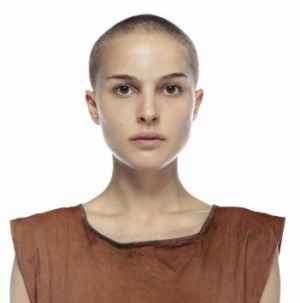
Evey Hammond and Batman are by no stretch of the imagination completely different protagonists. One is a citizen of London who slowly starts to follow in V’s belief, and the other is a man who dresses in a costume to evoke terror onto the criminals of his city. The biggest difference between them is they both have different character arks in regard with themselves of the anarchists. Evey is soon shown the world through V’s eyes, and soon joins his cause, no longer wanting to be ruled over by a forceful government. Batman on the other hand wants to bring down the Joker, while at the same time not stooping to his level of violence.
Evey Hammond’s character arc starts out with her simply being in the wrong place at the wrong time. After walking the streets after her curfew, she is attacked by three men in an ally, and is soon saved by V. At this point, V looks like the hero because of the common trope of damsels in distress being saved by a hero. Yet, her admiration for V is slightly shaken when he blows up one of London’s landmarks. She is torn about him because he is noble enough to save her from being attacked from being on the streets, but he enjoys the destruction of a building by his own work. V is the start of Evey breaking out of her shell, even though she is conflicted with V at first. She is fully aware that her government is oppressive, but knows she is one person, and she feels powerless against them. Later on in the film, she stops a police officer from arresting V, and V repays her by letting her stay in his hide out, so police cannot find her. She is now in too deep, and it is hard to see a way out of it.
Even when her parents are taken away for their rebellious activities, Evey is too scared to do anything out of line, that would upset the government. So when her close friend Dietrich is up handed by the government in the exact same way as her parents were taken, she soon understands that ignoring the problem won’t make it go away. Her loyalty for V is put to the test when she is captured and imprisoned, and will be let go if she just tells the location of V. She refuses and is tortured and held in a cold dark room, as a way to break her. Even when she is threatened to be executed, she will not give in, and because of her determination, she is freed. It turns out the whole prison was a fake made by V, and he did not want to put Evey through that excruciating hell he put her through: he had to be sure that she was devoted to his cause, and that she would fight to the very end. Her character ark has finally been completed, as she has been reborn, just like V.
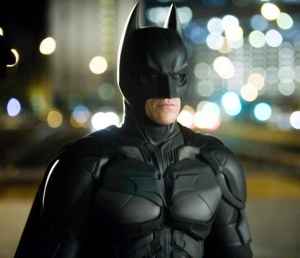
Batman/Bruce Wayne is different from Evey because Batman is unlike anyone else. He makes a name for himself by scaring away criminals in his path, to the point that even the gangsters go underground with of all their illegal activities. From the beginning, Batman already has the courage in him, therefore he already knows who he is, and has his own moral code he will not break. That code is to never kill, and living in a city where cops and murderers both kill, that’s easier said than done. When the Joker come in to town, he practically turns the city upside down, making everyone turn on each other like a pack of dogs. The Joker says that every day the Batman does not remove his mask, the more people will die. Batman is a symbol of hope, and Joker hates that. Instead of just killing Batman, the Joker decides to play with Batman, because he sees him as more interesting than just another cop or gangsters. Batman is in a tough situation: how can he stop a man like the Joker without taking his life? He can’t just be put in prison because his mind is so broken, he would learn nothing from being in an iron cell, and also because he escaped police custody with ease. To further establish this point, Batman could have easily hit Joker with his Bat-pod when joker in the middle of the street, but he could not because he does not want to stoop to Joker’s level.
Batman goes in to retirement for a little while, as a way to see if Joker will stop his relentless attacks on the city, but soon comes to term that the city needs him. He works outside the law, which means he can get into places no one else can. When the Joker is put in to custody, Batman decides to talk to him face to face in an interrogation room. This is a literal battle between two different ideologies, one being pro-authority and the other being anti-authority. Batman is a noble crime fighter because of his way of finding an alternative way besides killing to any situation. The problem is he leaves the people he cares for to get easily hurt, or even worse, killed. His childhood friend, Rachel, who he loved for a long time, was put in a situation by the Joker: Batman has to choose either the life of her or the man she loves, Harvey Dent. While Batman does all he can to save both of them, in the ends he saves Harvey, while Rachel shockingly dies. Batman makes the “logical” choice by saving the District Attorney the city of Gotham needs, but at the cost of Rachel’s life. Batman shows that killing and submitting to anarchy is morally wrong, but with that comes the unrelenting responsibility of saving his loved ones, without succumbing to his dark intentions.
The Politicians
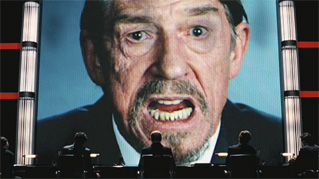
The politicians and the governments they run are depicted in very two different ways. In V for Vendetta, the government and the politicians are the antagonists of the film and are shown as corrupted. They threaten their citizens by ruling over with an iron fist, and will crush anyone that either revolts against them, or mocks them in any way. When a skit on television that makes fun of the London’s ruler, Adam Sutler, appears as a Benny Hill styled slapstick, it is still seen as offensive to the president’s name, and the host is taken away by force.
The main driving force for this totalitarian society is the ruler of London, Adam Sutler, better known as the High Chancellor. He is the literal face of oppression in London’s society, as he is mostly seen on a giant screen barking out demands to his men. Because Adam Sutler is ruler of the oppressed London, it naturally makes him the number one target for V to take out. V first kills all the people who were involved with experimenting with him. He sees High Chancellor as the last threat in this revolution. The High Chancellor is betrayed by one of his own men, Creedy, as he is handed over to V and shot in the head like a dog. Like Evey’s parents, so many people have been taken away with bags covering there faces, and then killed, for their supposed betray of their country: It is ironic to see the High Chancellor being executed the exact same way.
The Government in The Dark Knight is more realistic, and is not corrupted or oppressive to it’s citizens. The film is more focused on antagonizing the criminals and mob bosses in Gotham, and portraying the police and politicians trying their best to stop the criminals actions. What The Dark Knight has that V for Vendetta does not have is a wedge between law enforcer and criminal, that wedge being Batman. He knows how to stop himself from stepping over the line of criminal intent, yet he does not wear a badge or require paper upon paper in order to detain a criminal. Because of his role in Gotham’s fight against crime, Gotham needs him because of his aggressive yet restrained way of preventing crime.
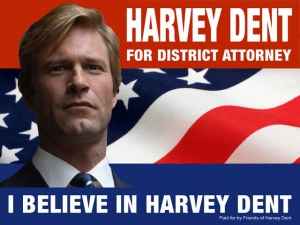
While Batman is the one who deals with the criminals on the streets, Harvey Dent is the one that deals with them in court, to make sure they get what they deserve. Harvey Dent cleans up the city without having to get his hands dirty, by running for District Attorney. He is the opposite of Batman, not just because he deals with the criminals in court, but also just because he is refereed to as Gotham’s White Knight. Unlike Adam Sutler, Dent having his face plastered everywhere is a good thing, giving people inspiration. While Batman is controversial among the city, Dent is beloved by everyone. Even Bruce Wayne’s love interest Rachel is in love with him, to the point that she considers marrying him. She loves Bruce for what he’s doing for the city, but still want a normal life, and Dent brings the best of both worlds. Every citizen loves him and they don’t know what they would do without him, which makes him a huge target in Joker’s scheme.
Unfortunately, with every great noble person that is out there, there is an inevitable dark side that lies beneath them. Harvey’s dark side emerges when he threatens one of Joker’s henchmen in order to get information out of him, by having a literal coin toss as to whether he kills him or not. What puts Harvey over the edge is when Rachel is killed in a choice over his life over her’s, and he was chosen to live because of his importance to his city. If Joker’s intention was to prove that anyone can be corrupted, he succeeded because his mind is broken, and now calls himself Two-Face. Two-face judges all his victim’s lives the same way Rachel’s life was judged, with a 50/50 chance. Now all his decisions are decided by the flip of a coin, and he even threatens to kill people who are innocent. When he tries to kill Commissioner Gordon’s family as a way to make him feel the way he feels, Batman has to intervene and stop Dent as the criminal he has become, leading to Dent accidentally falling to his death. Now the city is without its White Knight at its time when the city needed him the most.
The Big Picture
Both these films have the same concepts of anarchy, but not the same context. V for Vendetta’s portrayal of anarchy is used only for in its own story, and should not be implemented in our society. The real world government may be far from perfect, but at least they’re not ruling over us like London’s government did in V for Vendetta. Although, this may not be the same for other countries’ governments; for example, North Korea. Their government can be seen as very oppressive, not only making it law for all citizens have a picture of their leader Kin Jong Un in their house, but also threatening anyone that talks out against them; i.e The Interview. While there are examples of oppressive governments in our society, does it still condone the actions of anarchy?
The theme of anarchy in The Dark Knight bring up a relevant question: after the commencing of anarchy is complete, then what? Would the world really be better if it was run by terrorists, or psychopaths? Could we as citizens really handle the massive responsibility of running a government, or would we just crash and burn because of conflicting views getting in the way of the big picture? The reason The Dark Knight is so realistic is because it presents anarchy not as a justifiable mean, but instead as something that people are scared of. In the climax of the film, Joker has rigged the two boats, one containing the citizens of Gotham and another full of prisoners. The Joker gave the two detonators to each boat, to see who would blow up who first. Yet, after much discussing, neither boat blows up, proving that Joker was wrong; people, even prisoners, have a conscience.
Anarchy does not engross people to join its cause, but instead causes them to despise the anarchist/s. In the aftermath of anarchy, people come together to remember those who were caught in the cross fire, and try to do their best to never implement that kind of mindset. Anarchy has never saved the government, and it never will.
What do you think? Leave a comment.











I think it should be noted that “anarchy” is not synonymous with “disorder” or “chaos,” as you seem to think. As an anarchist, I find it quite common that people who don’t have knowledge of what anarchy is as a political system use the typical propaganda-driven definition of the term. There are multiple forms of “anarchy,” but the most popular is more synonymous with social libertarian ideals than with the ideals of chaos or disorder. Anarchy is actually a highly intelligent branch of political thought and ideals, and although I understand what you’re saying in your article, I think it’s important to note that what you mean is anarchy by the definition of “chaos,” not anarchy in its actual definition. If you’re interested in actual anarchy, Noam Chomsky, Bakunin, or Emma Goldman are good places to start for some reading.
You have a good point. Maybe when I was I was taking about anarchy as a means of violence, is probably should have used the word “chaos” instead. I was more basing the definition of anarchy as a lack of government, I just should of used my phrasing better. Thank you for the feed back.
I think every reader will certainly know what you meant by the term, as I did, as well. I just found it worth bringing attention to. Thank you for being so open about it!
These are two of my favorite films. I really liked your comparison of the Joker and V. I would have not put those two together because V is the antihero where the Joker is obviously villain. Well done!
Im glad you liked. I wasn’t sure if comparing too different movies would work because It is like comparing apples and oranges. Yet, it worked out in the end.
Personally I believe ‘V for Vendetta’ to be, partly, a meditation on the corruption that violence brings.
That is a really deep way of depicting V as a character. Honestly, he can be interpreted in many different ways.
My take on V for Vendetta is that all organised government tends towards fascism and that genuine freedom of thought and expression tends towards anarchy. Choose a side before it chooses you…
That statement is very true. V for Vendetta is one of those properties that can be discussed for hours.
This mag keeps getting better and better!
Honestly TDK is overrated to me. V for Vendetta is better in my eyes.
I suspect if you asked Mr Moore what he felt was the opposite of fascism he would not say socialism or democracy, he would say anarchy.
That’s why Alan Moore is such a smart and intelligent guy.
An anarchist is someone who wants to abolish an authority as considering it useless. The Joker considers that the way these people (schemers) have every little detail planned is a ‘pathetic attempt to control things’. He wanted to establish chaos by ‘upsetting the established order’ and in that way he took control of the situations by planing to get caught to get Lau, the mob’s money and being the ultimate Gotham’s criminal. But what’s more important, he planned all that to confuse Batman, and he did.
Couldn’t have said it better myself.
V wasn’t an anarchist, he was a terrorist.
Anarchists often use the mask as a symbol of defiance and independence, but the right wing also use it as a warning to the government that they will blow them apart if they allow more immigrants in etc. it’s a political ambiguity that Moore probably didn’t intend or even imagine at the time of writing, but the actions of V are questionable and the ends cannot be used to justify the means employed. It’s a great story, but it is not a manual for self determination.
Yes, Out of context, the film seems morally wrong for supporting terrorist actions. Yet, in the story itself, it works because it is being told from a “what if” way of storytelling. But like you said, It not the best film to take political ideas from, and to apply it into our real world. It would just lead to unnecessary blood shed.
Both are a work of beauty and magic.
The filmmakers obvious goal in V was not to present a treatise on anarchy and why it is an ideal (and make no mistake, no matter what Moore says now, “V for Vendetta” presents anarchy as a wonderful thing, without fully dealing with the consequences), but theirs was to make what they thought was a scathing commentary on the current political situation in the US.
Whether wrong or right in their aims (I am withholding my personal opinion here), and whether they succeeded or not, if they wanted to get that idea across, they probably should not have chosen to adapt V for Vendetta, as the basic premise of the work is opposite to what they stated.
In any event, I like the film in the spectacle aspect, and think Hugo Weaving’s performance as V was great, but I by far prefer the book.
I agree with you there that the book works better, mostly because the world was not so black and white in the book. This is probably why Alan Moore hates the film so much, saying they “Americanized” it too much.
Two good movies, but V is better in my opinion
What I think that V For Vendetta does very well with this is to show the way that a crisis is used to justify/rationalise/catalyse the tendency towards right wing politics or the bias of organised governments towards the right.
I suppose that a current resonance could be drawn from the coalition policies, if you accept the ‘shock doctrine’ or Chicago School theory that the government is exploiting a critical situation, in our case the economic crisis, to push through ideological legislation.
I suppose the question is, is an authoritarian, possibily fascist, type of goverment democracy’s ‘default setting’; the one to which it returns when prompted by a crisis? Or is it the case that politicians and actors sympathetic to this system are simply better at reacting to crises and are therefor better placed to exploit them? A third, related, option is this: during times of crisis, is this style of goverment what the people actually want?
I’ve always said, V for Vendetta is more than a standard political comic book movie, It’s amazingly complex. It can’t be summed up so simply because it has so many deep theme and concepts about oppression, and terrorism. The question you are asking are totally related to what the film is asking.
Tough matchup.
Never connected with V for Vendetta. A story about a guy in a mask seems silly for an art form that is all about the close-up shot.
,
V embodies the potential good in systemless-ness, if that’s a word, while the Joker embodies the potential evil. Anarchy in itself isn’t good or bad, but the way it’s defended (and it does have to be defended against those who would seek to replace it with another govt) is what must be morally evaluated.
I really enjoyed reading this article! I have seen both movies and I do agree with your opinion. great read as well
Thank you. This has become one of my favorite articles to write about.
Awesome article! I think it’s really exciting that comic book movies can be layered with political subtext instead of just being straightforward superhero stories. I’d be interested to read more articles like this!
Thank you, I’m glad you liked it.
the difference i see is v’s anarchy is hoping to accomplish something. the joker is by his own admission a dog chasing something he wouldn’t know what to do with if he found it. he is by definition a rabid dog who wants to watch the world burn.
Great article, though I’m not sure either movie is really about anarchy in the strict sense. The Joker describes himself as an agent of chaos, but he is much more of a terrorist than an anarchist. The Joker enjoys killing, but he is not interested in abolishing laws as such. V wants to overthrow the government and he encourages anarchy as a temporary state of protest against a Fascist government. The image of the crowd of people all wearing Guy Fawkes masks is an image of anarchy in one sense, but it is more an image of solidarity and democracy in another. V is not against all governments, just unjust ones. Likewise, the Joker is not interested in overthrowing the government–the government is actually useful to his plans–but in instilling fear.
It might be interesting to extend this analysis to The Dark Knight Rises, which deals more with anarchy in the strict sense.
You have a fair point. I guess it all comes down to what defines an anarchist, which can be very broad in many ways. Regardless, thanks for reading 🙂
I think V and joker can be very good partners for any specific work but can become supper enemies towards eachother, but as batman don’t kill people he can’t help both not v and definitely not joker
The implied history of Guido Fawkes is incorrect here: in the actual history, Fawkes was not a revolutionary in the commonly-understood sense but rather a counter-revolutionary.